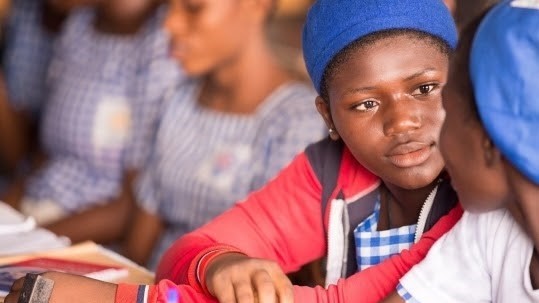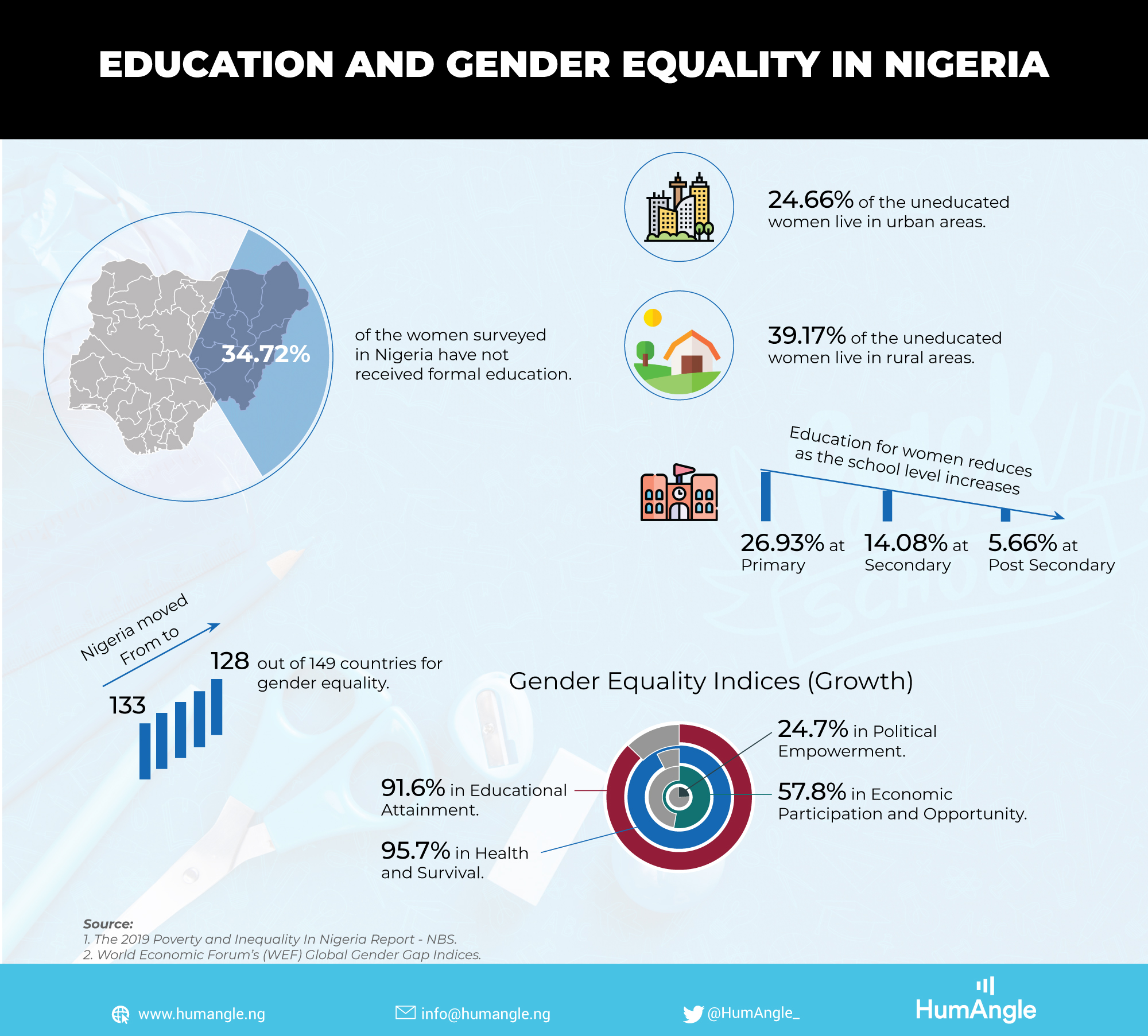Inadequate Education Opportunities Widen Gender Gap In Nigeria

Recent statistics from the National Bureau of Statistics (NBS) has shown that education as a key indicator contributing to poverty that heavily impacts women and girls.
The NBS released ‘The 2019 Poverty and Inequality In Nigeria Report’ and the education survey revealed that 34.72 per cent of women in Nigeria had not received formal education.
The data showed that the gap became wider when the survey moved from urban to rural communities.
That 39.17 per cent of the uneducated women live in rural areas while 24.66 per cent live in urban areas, the report showed.
The numbers for women dropouts increase as the education levels increase, it said, adding that data showed that when female students reached the secondary level their numbers fell by nearly double the rate at the primary school level.
The NBS reported that primary school enrollment for women stood at 26.93 per cent, while at the secondary level, the number was 14.08 per cent and 5.66 per cent at post secondary school level.

Olabukanola Williams, Executive Director of Education, attributed the large gender education gap to cultural beliefs which denied women and girls the right to education and economic empowerment.
“Social and gender norms that support the idea that educating a girl is a waste of money and time, and that girls should marry early without being able to decide when, to who, or how, contribute to this disparity.
“Until we address these norms and ensure families have the economic means to educate girls, we will continue to see these abysmal numbers for boys too, but particularly for girls,” Williams said.
She said that political and community leaders, policymakers and parents must help shift cultural norms to include women and girls.
Investing in the education of girls beyond the primary school level is a positive step these stakeholders can take, she said, adding that adequate financing and a commitment to ensuring gender parity in schools must happen through effective policy measures.
Williams noted that improving girl child education was a requisite ingredient for improving women’s contributions to national development and economic growth.
The International Monetary Fund said promoting gender equality could be an economic game-changer for Nigeria and closing the gender gap would mean higher growth and productivity, and greater economic stability.
While inaugurating the headquarters of the Federal Ministry of Women Affairs in January, President Muhammadu Buhari said that Nigeria had 13.2 million out-of-school children and the girl-child accounted for 60 per cent of the figure.
The president promised that his administration would sustain its efforts to end child marriage and improve girl-child education in the country.
Nigeria currently ranks 128 out of 149 countries for gender equality in the recent World Economic Forum’s (WEF) Global Gender Gap Indices.
Educational attainment, political empowerment, economic participation and opportunity as well as health and survival were cited as the four major indicators.
The country has had a slight improvement from 2018, previously ranking at 133.
The WEF reported that globally, the largest gender gap was in economic empowerment with only 24.7 per cent of the gap closed in 2020.
Economic participation and opportunity follows with 57.8 per cent closed.
Although the rankings in Nigeria are low, on a global scale the gap in educational attainment has increased to 91.6 per cent with health and survival increasing at 95.7 per cent.
Despite these slight improvements, in 2016, Nigeria was ranked one of the 20 worst countries for women alongside Pakistan, Afghanistan and Iran.
Erelu Bisi Fayemi, the wife of the Ekiti State Governor, has used her platform to advocate for gender rights.
At the 2019 Biennial Conference on gender and actualisation, she stated that Nigeria was not meeting the international standard of raising the status of women.
She said, “not only did Nigeria not meet any of the original Millennium Development Goals, if care is not taken, we might not meet most of the SDG (Sustainable Development Goals) goals in 2030 either.”
She also noted that Nigeria had not effectively implemented international agreements from the Convention on the Elimination of All Forms of Discrimination Against Women and the African Women’s Protocol to protect the rights of women and girls.
Fayemi added that gender initiatives were under-resourced at the state and national levels which hindered effective policy implementation.
(Additional reporting from Abdullahi Murtala)
Support Our Journalism
There are millions of ordinary people affected by conflict in Africa whose stories are missing in the mainstream media. HumAngle is determined to tell those challenging and under-reported stories, hoping that the people impacted by these conflicts will find the safety and security they deserve.
To ensure that we continue to provide public service coverage, we have a small favour to ask you. We want you to be part of our journalistic endeavour by contributing a token to us.
Your donation will further promote a robust, free, and independent media.
Donate HereStay Closer To The Stories That Matter




